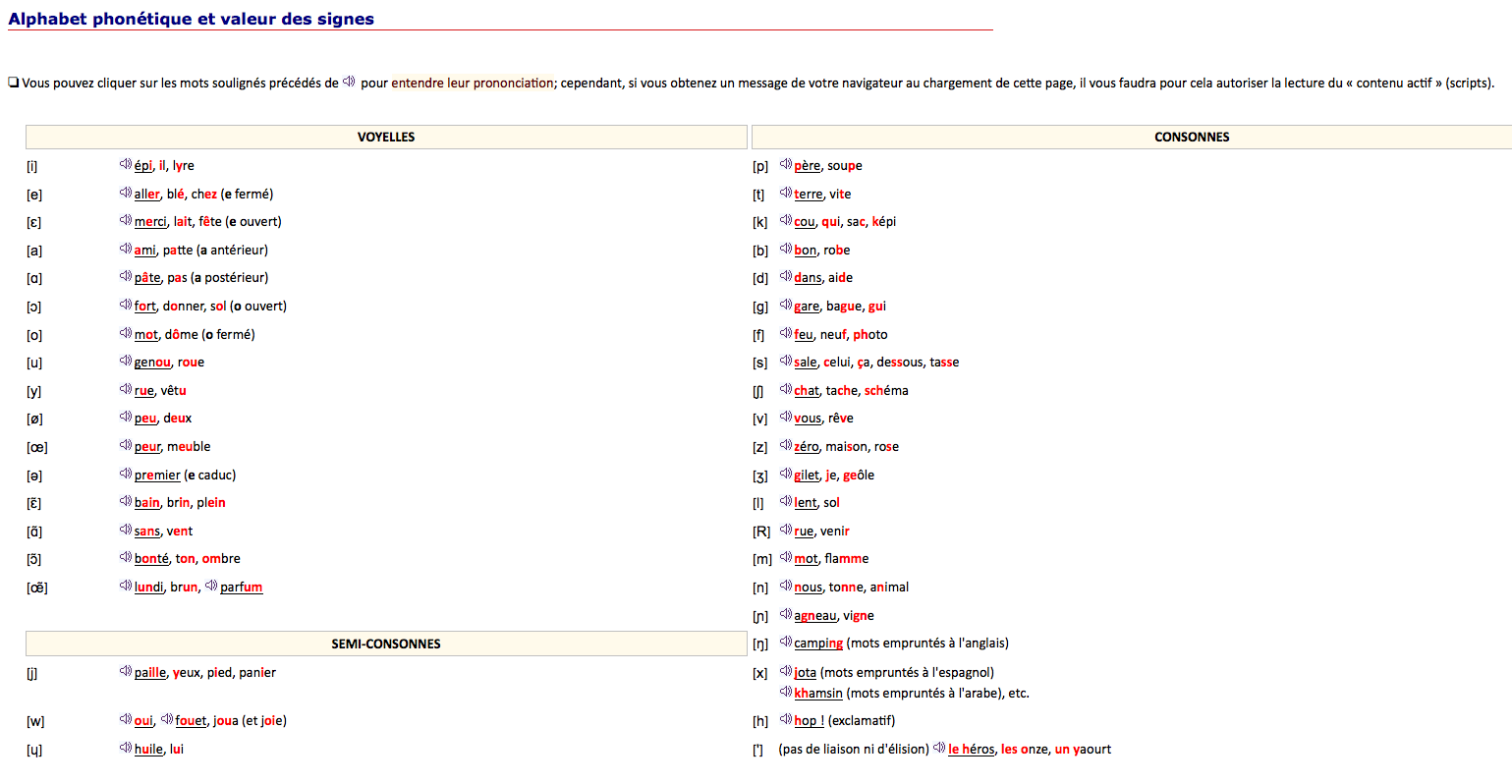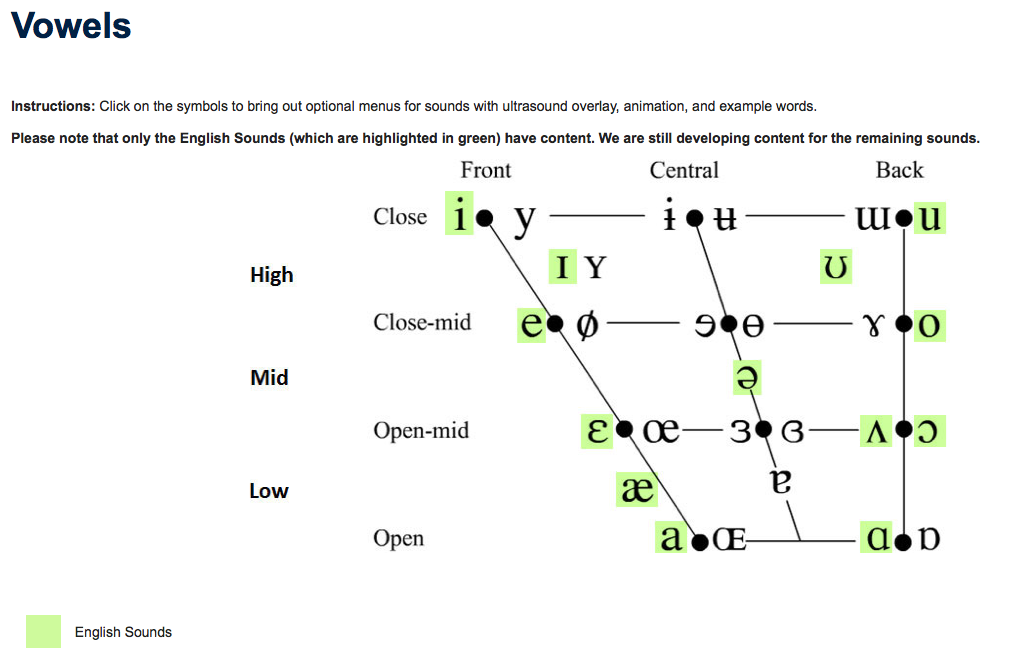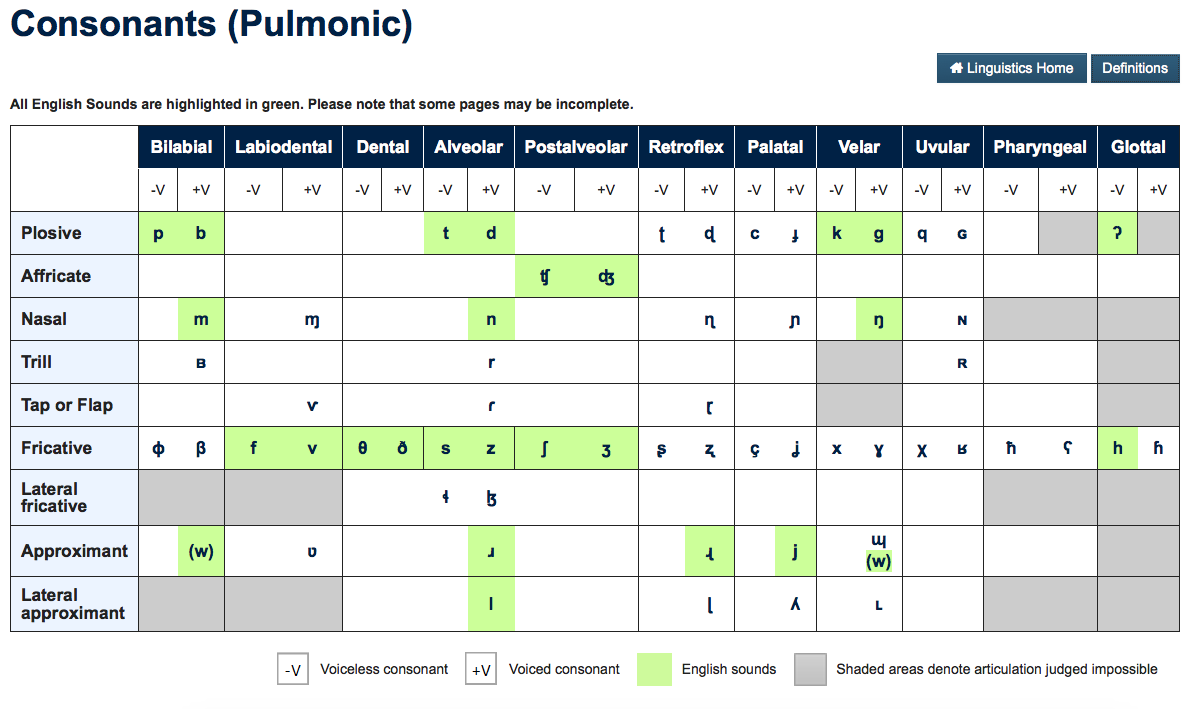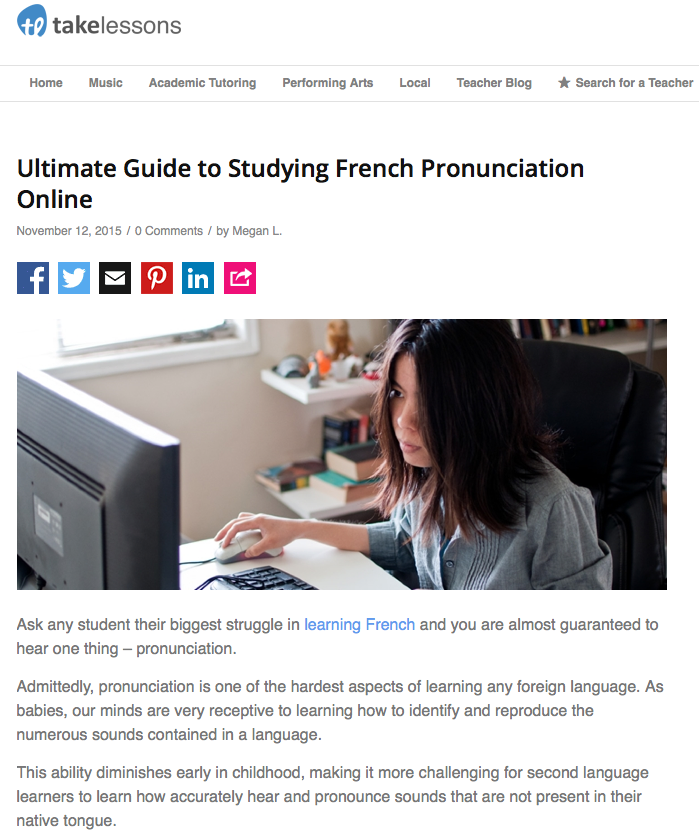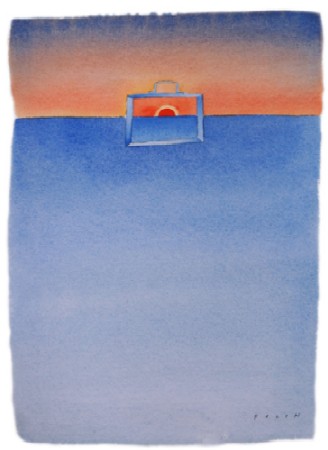Category Archives: information
Protected: ARCHIVE: 2016 SUMMER TERM 2
Midterm take-home exercise

PLEASE NOTE: THIS IS NOT AN EXAMINATION!
The word “midterm” is an adjective. It is not a noun, and should not be interpreted as an abbreviation for “midterm examination.” Just as not all exams are midterms (ex. final exams), not all midterms are exams. All that “midterm” itself means is: [something that is] “in the middle part of a term, not at the beginning or end.”
INSTRUCTIONS:
This may be a new format for you.
It is not a formal exam. It will follow the form of the final exam:
- Grammar and vocabulary: 40%
- Reading comprehension: 10%
= a short text in French to read, questions in French to answer in English or in French according to preference (you may switch between languages too…) - Shorter open-ended writing: 10%
= a choice of two questions (answer only one) requiring the expression of an opinion or judgement - Longer writing of a composition: 40%
= a choice of three topics, at least one of which will ask you to respond to an image that you may not have seen before
(The attribution of points is slightly different: in the final exam, the composition is worth 20% rather than 40.)
This exercise should be useful for practice in a more relaxed setting. It’s only worth 5% of your final grade, so that should help to alleviate stress too. In short: this is not an exam. It *should* be an interesting and useful exercise.
You will have one week in which to do the midterm from the day and time you receive it.
For students new to UBC, this exercise could be an opportunity to explore quiet working spaces around campus and Vancouver: UBC libraries, anywhere else on campus, in a café, in the comfort of your own home, on the beach, etc.
It is an open-book exercise: this means that you may use your textbook, notes, and indeed online resources. But not other people, especially not French-speaking friends, tutors, etc. And being an open-book exercise, it wil be harder than an exam “proper” in exam conditions would be. The questions will require you to research (ex. look words up), reflect, analyse, and formulate arguments and judgements. The exercise will involve applying what you know to new situations (though any exam should be doing that too, stretching you intellectually, these aren’t high-school multiple-choice tests). But you will be able to look up whatever you need to.
It will be on ch. 5, 6, and the start of ch. 7 (as done in class; see class notes in our shared Dropbox). It will also involve the readings at the end of ch. 7.
You will have several options for writing and submitting the midterm: please check with your instructor what their preference is. Here is what Dr O’Brien is accepting, for reference:
1. Do it online: directly from the PDF or copy-pasting it into another file. Then email your completed work to me by 9 a.m. on Monday 6 March 2017.
2. Or do it online then print it out and bring it to class on Friday 3 March 2017.
3. Print it out and complete it by hand. Pen or pencil is fine. Visible colours, no pastel green etc. You may also use further paper and attach that to your midterm… And then hand it in to me in class on Friday 3 March 2017.
That’s it!
THE EXERCISE ITSELF
There may be variations from section to section of the course; here is the version for FREN 102-204 / O’BRIEN:
- PDF = https://www.dropbox.com/s/onztlj7ky6zg63r/102_16W2-midtermv3.pdf?dl=0
- docx = https://www.dropbox.com/s/sdwtt9yu6by8evn/102_16W2-midtermv3.docx?dl=0
RESOURCES
- Dictionaries: mostly free and online, plus some in UBC and Vancouver public libraries (NB Google Translate is not a dictionary: while it’s useful for many purposes, for an exercise like this midterm or compositions, you should use a proper actual dictionary)
- See also: revision guides
- Sample midterm take-home open-book exercise (from FREN 102 last summer): https://www.dropbox.com/s/o4bugrho8wlgcqy/102_16S-midterm.pdf?dl=0

FAQ
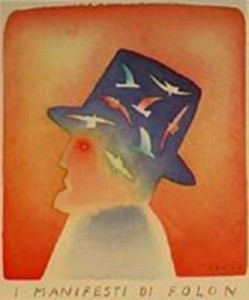
FAQ ABOUT FREN 102
● What materials do I need for this course?
● How do I set up and use the online (iLrn) course materials?
● Whom should I contact for further questions, support, and troubleshooting about iLrn exercises?
● What assignments do I have and when are their due dates?
● What will be on the final exam?
● I think I’m entitled to an accommodated exam, or to exam accommodations?
FAQ ABOUT FRENCH AT UBC: PLACEMENT, REGISTRATION, ETC.
● Is FREN 102 the right course for my level and requirements?
● I have already done some French: which course would be more appropriate for me?
● How do I find out what level my French is at?
● What can and should I do if a class/section is full?
InFAQ
● I have other questions about French at UBC…
● HELP! I need help. Please help?
Further questions, uncertainties, comments, other issues throughout the term:
- please email the course co-ordinator: Dr Juliet O’Brien
- Email: juliet.obrien@ubc.ca
—She reads her email at least twice a day during usual working hours: that is, Monday to Friday, 9:00 a.m. to 6:00 p.m. She usually replies by the next working day—if you email between a Friday evening and a Sunday evening: then Monday—and sooner if the matter is urgent.
—NB: Please include your course information—ex. “FREN 102-201″—in your email subject-line; otherwise your email will go to “junk” rather than a filtered priority folder. - Office hours: (by appointment; please email to arrange a mutually-convenient time)
- Office: Buchanan Tower 728
Movies & TV in French
TO BE UPDATED IN THE FIRST WEEK OF JANUARY
MOVIES THIS TERM (LAST UPDATED 2015-02-10)
Horizons, ch. 6, La Belle et la Bête:
- The full movie, online (Jean Cocteau 1945):
- The script (Jeanne Marie Leprince de Beaumont, 1757), in French
- English translation
- About the author
Movies in French in Vancouver in week 6 (9-15 February):
- Rendez-vous du cinéma québecois et francophone
This week (11-15 February), at SFU Woodward:
Wednesday 11 February 18:30 & 20:30
Thursday 12 February @ 18:00 & 20:30
Friday 13 February @16:00, 18:30, & 20:30
Saturday 14 February @ 14:00, 16:00, 18:30, & 20:30
Sunday 15 February @ 14:15, 16:30, & 19:00 - Information + trailers (trailer = “bande-annonce”) at francouver.ca
- Information + trailers at rendez-vousvancouver.com
Movies in French in Vancouver during spring break / reading week, in case you are still in Vancouver and looking for something to do that is both useful and relaxing, and that may be very useful for FREN 102…
- Winterruption (21-22 February), at Granville Island Waterfront Theatre:
- Information + trailers for both days (francouver.ca)
- Saturday 21 February 14:30, 16:30, & 19:00
Information (in English) + trailers - Sunday 22 February 14:30, 16:30, & 19:00
Information (in English) + trailers
Movies in French after the break:
- Tuesday 24 February: 15:00 Buchanan Tower 799, UBC (FHIS cineclub, free)
Les Intouchables
Trailer - Wednesday 25 February: 19:30 Alliance française Vancouver, 6161 Cambie Street (c/o Le Club français; free for members, $4 for non-members)
L’écume des jours
Trailer - Friday 27 February: 19:00 Buchanan A101, UBC (FHIS cineclub, free)
Maïana
Information + trailer - Friday 27 March: 19:00 Buchanan A101, UBC (FHIS cineclub, free)
Mommy
Information + trailer
AND ANOTHER PERFORMANCE-ARTS EVENT…
 MOVIES AT UBC AND AROUND VANCOUVER, IN GENERAL
MOVIES AT UBC AND AROUND VANCOUVER, IN GENERAL
Here at UBC:
- FHIS CineClub (free)
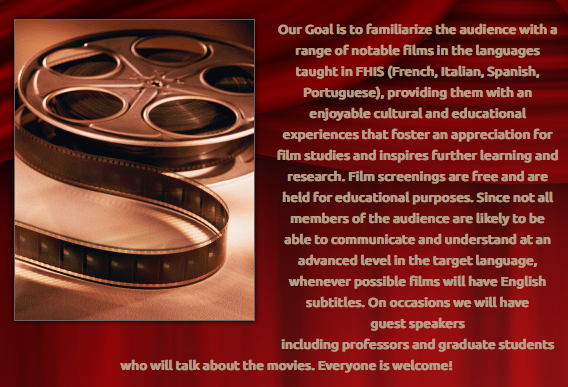 French movies this year:
French movies this year:
October 21st. 2014: Entre Les Murs (2008)
November, 18th 2014: Le Petit Nicolas (2009)
January 27th 2015: Le Diner De Cons (1998)
February 24th 2015: Intouchables (2011)
March 24th 2015: Paris Je T’aime (2006)
- Le Club Français UBC / UBC French Club : often has events in French, including movie nights
- UBC Library has a good collection of films in French (free):
1. find out information about a film from IMdB and Wikipedia:
Wikipedia > list of films by country
Wikipedia > list of films by country of production
Wikipedia > list of French-language films
Wikipedia > list of French films (with sub-lists…)
2. look it up in the library catalogue
3. borrow it and watch it in the comfort of your own home…
4. tip: the Videomatica collection
In Vancouver:
- Vancouver Public Library (free)
- Black Dog Video (video store, rentals, not free)
- Limelight Video (video store, rentals, not free)
- They Live Video (video store, rentals, not free)
- Vancouver International Film Festival (not free), 25 September – 10 October 2014:
the full programme – a fine selection of films in the “Spotlight on France” series – and films listed by country (useful for films in French that are not from France, or otherwise don’t fall into the “Spotlight on France” category)
Worldwide, online:
- Radio-Canada: free radio and TV online (Canada)
- TV5 MONDE: free French radio and TV online (France)
- Arte : European culture and public service TV channel (in French, also in German; based jointly in France and Germany; read more about it…)
- Tennessee Bob’s Famous French Links: a classic, one of the largest and oldest supersites in the world, for all things French and Francophone: including links to radio and TV online
- you will also find many newspapers and magazines in French freely available online, plus sites for sports, music, and all imaginable leisure activities.
Just find the French term for what you are looking for–Google translate or Wordreference can help–then search for it online - Netflix (not free): some TV and movies in French
- material on YouTube (free)
Protected: L’essentiel de la salle de classe
Protected: NOS COORDONNÉES
French pronunciation
Your French pronunciation and oral production will not be tested in FREN 101 & 102, as this is a course on general French (especially grammar, vocabulary, comprehension, and culture) rather than a course specifically on French pronunciation and conversation.
We will, however, be working on pronunciation a little in class (ex. a few minutes of warm-up exercises at the start of class, your instructor pronouncing new vocabulary, etc.). You will see that there are pronunication tips and exercises throughout your textbook, usully in grey boxes labelled “PRONONCIATION” followed by a “Prononcez bien!” exercise: for ex. ch. 1, compétence 1 (p. 35); compétence 3 (p. 46-47); compétence 4 (p. 52-53). You can also work on these exercises for longer outside class, ex. in study-groups with fellow students (vos camarades de classe).
From Le Robert (dictionaries), here are the sounds of French, with audio files so you can hear how each sound is pronounced within a word:
Here are some general guides on pronunciation, on producing sounds in general (including sounds in French), from UBC’s eNunciate project.


They include (for many-to-most sounds) videos, animated video diagrams, instructions for producing the sound, and further links to yet more online materials:
Here is a very useful free, open, online collection of resources:
Here are some basics from other sources on French pronunciation:
- http://french.about.com/od/pronunciation/a/beginningpronunciation.htm
- http://french.about.com/od/pronunciation/a/letters.htm
- http://apprendre.tv5monde.com/fr/search/site/Prononciation?f[0]=im_field_niveau%3A19
- http://www.frenchsounds.com/FSYouTubeLinks.html
- There may be some on the old BBC French site too, but it’s been somewhat dormant of late.
- About.com has substantial resources for French: useful.
***EXTRA FRENCH (PRONUNCIATION, VOCABULARY-BUILDING, PRACTICE)***

- Duolingo (free, and available as an excellent app)
- + listen to and watch as much in French as you can : for some suggestions, see RESOURCES on this present site > TV & MOVIES IN FRENCH
On phonetics in general:
On French pronunciation and sounds (in French):
- http://phonetique.free.fr/
- Wikipedia (in French), “Phonétique française“
- http://www.lepointdufle.net/phonetique.htm
UBC resources & useful links
UBC FRENCH
- Days, times, and classroom locations of all the sections for FREN 101 are at UBC Student Services > Course Schedule > FREN 101
- The Department of French, Hispanic and Italian Studies
- FHIS > Undergraduate French > Advising and their FAQ
- FHIS French tutors list
- NEW FHIS Multilingual Learning Centre
The FHIS Multilingual Learning Centre is a free service available for students of all levels and languages of the FHIS curriculum (French, Italian, Portuguese, and Spanish). We offer student-centered conversation practice, tutoring (i.e. grammar and vocabulary questions), and help with the continued development of core skills (i.e. speaking, listening, reading, and writing) necessary for students’ success in acquiring and becoming proficient in the languages that we teach.
A new schedule of sessions is posted at the Centre (BuTO 898) every Wednesday at 12pm and it is also always available on the FHIS Department’s website. Drop-in sessions are offered as follows for French: come alone or bring colleagues from class, online-exercise partners, etc:
 Students should bring their textbooks, texts, instructor guidelines for assignments, and any additional documents that will help consultants and students out during the session. For questions related to grammar, vocabulary, and language usage, students are asked to come with specific questions and/or (in most cases) previously graded assignments. Tutors will then help students to work through strategies to problem solve and arrive at their own answers through grammar and vocabulary modeling.
Students should bring their textbooks, texts, instructor guidelines for assignments, and any additional documents that will help consultants and students out during the session. For questions related to grammar, vocabulary, and language usage, students are asked to come with specific questions and/or (in most cases) previously graded assignments. Tutors will then help students to work through strategies to problem solve and arrive at their own answers through grammar and vocabulary modeling.
What shouldn’t I expect from my session?
- We will NOT proofread papers or compositions for you.
- We will NOT write last minute papers for you so please plan accordingly.
For further information, please view our Prezi:
UBC FACULTY OF ARTS
- Arts Student Support : http://students.arts.ubc.ca/student-support/
Arts Academic Advising : http://students.arts.ubc.ca/advising/
Buchanan D111
Monday – Friday 9:00 am to 4:00 pm
(usually afternoon (1-4 p.m.) = drop-in, extended hours at the begining of term, further details follow below)
Closed weekends and statutory holidaysThe Arts Academic Advising Office provides drop-in advising, Monday to Friday (1-4pm) in Buchanan D-111, answers brief questions via email or you can ask a quick general question on the Arts Facebook page.
 Email: Please include your student number
Email: Please include your student number
Domestic Students – arts.advisor@ubc.ca
International Students – arts.international@ubc.ca
Aboriginal Students – arts.aboriginal@ubc.ca
Phone: 604.822.4028 *For current UBC students

- Faculty of Arts grading guidelines: any course marks and your final grade may be adjusted to comply with these guidelines. For a version of these guidelines used by FHIS, see: Grading Guidelines for Content-Based Courses (Department of French, Hispanic and Italian Studies, UBC)
- Academic advising for all Faculties and Schools (not just the Faculty of Arts)
- Access & Diversity : http://www.students.ubc.ca/access/index.cfm
Brock Hall 1203
Email : access.diversity@ubc.ca
‘Phone: 604.822.5844
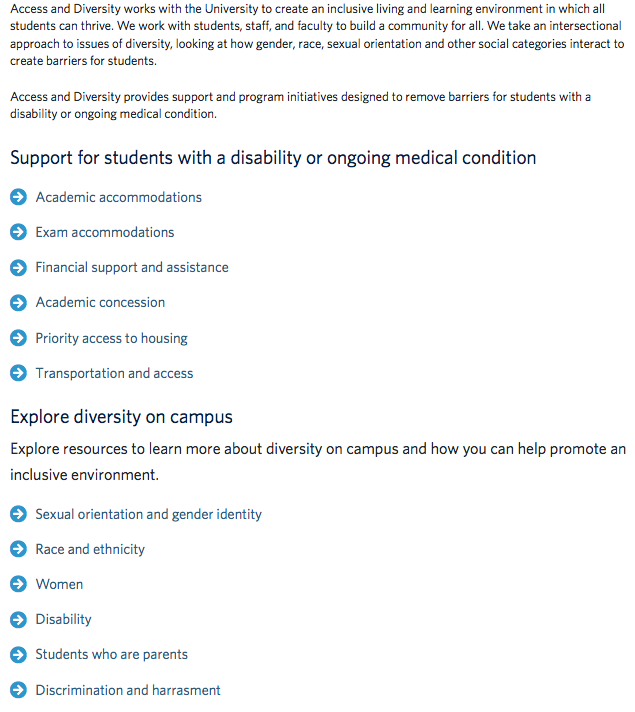
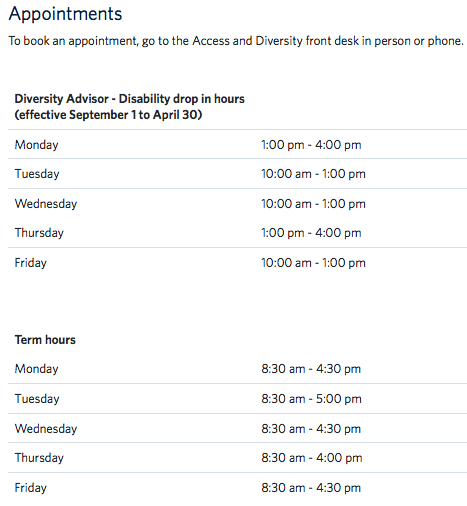
- Resources for students c/o UBC Early Alert:
Mental and physical wellbeing
Personal safety and security
Sexual assault
Academic
Accommodation for disability
Career
Concerns regarding fair treatment
Discrimination and harassment
Financial
International
Legal advice
Student-led programs - Early Alert:
Information for students
SAFETY, ACCIDENTS, EMERGENCIES
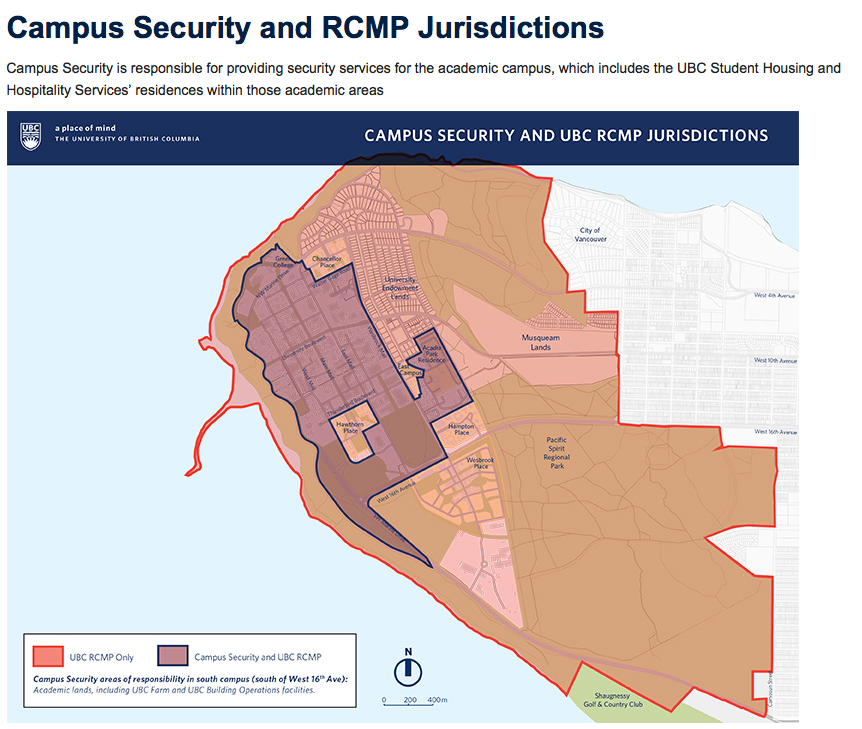
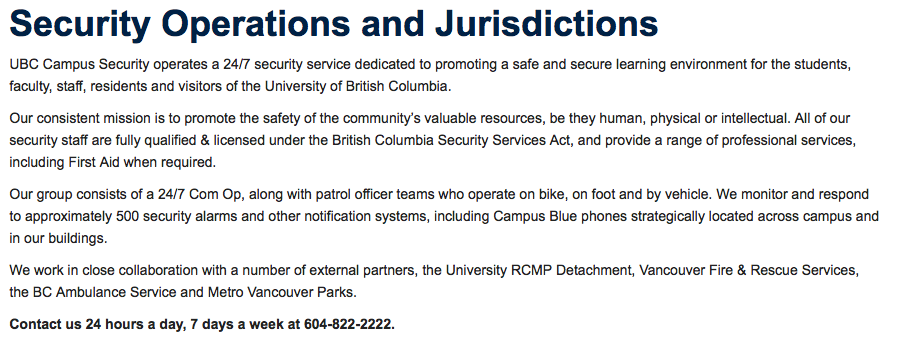
- 604.822.2222 = UBC Campus Security
- 604.822.4444 = Campus First Aid
- 911 = emergency services (ambulance, fire, police): on the UBC campus, call UBC Campus Security first (for practical reasons: the fastest response)
UBC POLICIES & PROCEDURES & RULES & REGULATIONS
- expectations:
student declaration and responsibilities: a reminder that upon registering as a student, you initiated a contract with the University and are bound by the following declaration:
“I hereby accept and submit myself to the statutes, rules and regulations, and ordinances (including bylaws, codes, and policies) of The University of British Columbia, and of the faculty or faculties in which I am registered, and to any amendments thereto which may be made while I am a student of the University, and I promise to observe the same.”
[…] Students are required to inform themselves of the statutes, rules and regulations, and ordinances (including bylaws, codes, and policies) and to any amendments thereto applicable at the University. For policies and procedures issued by the Board of Governors, see the University of British Columbia Policy and Procedure Handbook or the Office of the University Counsel for the official text. For policies issued by the Vancouver Senate, see the Senate for up-to-date copies.
The University authorities do not assume responsibilities for others that naturally rest with adults themselves. This being so, the University relies on the good sense and on the home training of students for the preservation of good moral standards and for appropriate modes of behaviour […]
The University and University authorities are not obligated to enforce any statutes, rules, regulations, or ordinances (including bylaws, codes or policies) if discretionarily enforceable by law or made under its, or their, power or authority.
- academic honesty and standards
- student conduct and discipline
- academic misconduct: cheating, plagiarism, etc.
- student conduct during examinations
- exam policies and accommodations
- final exam schedule
- UBC grading practices
- the Office of the Ombudsperson for Students
→ their overview
→ fairness info sheet, fairness toolkits
→ their FAQs
